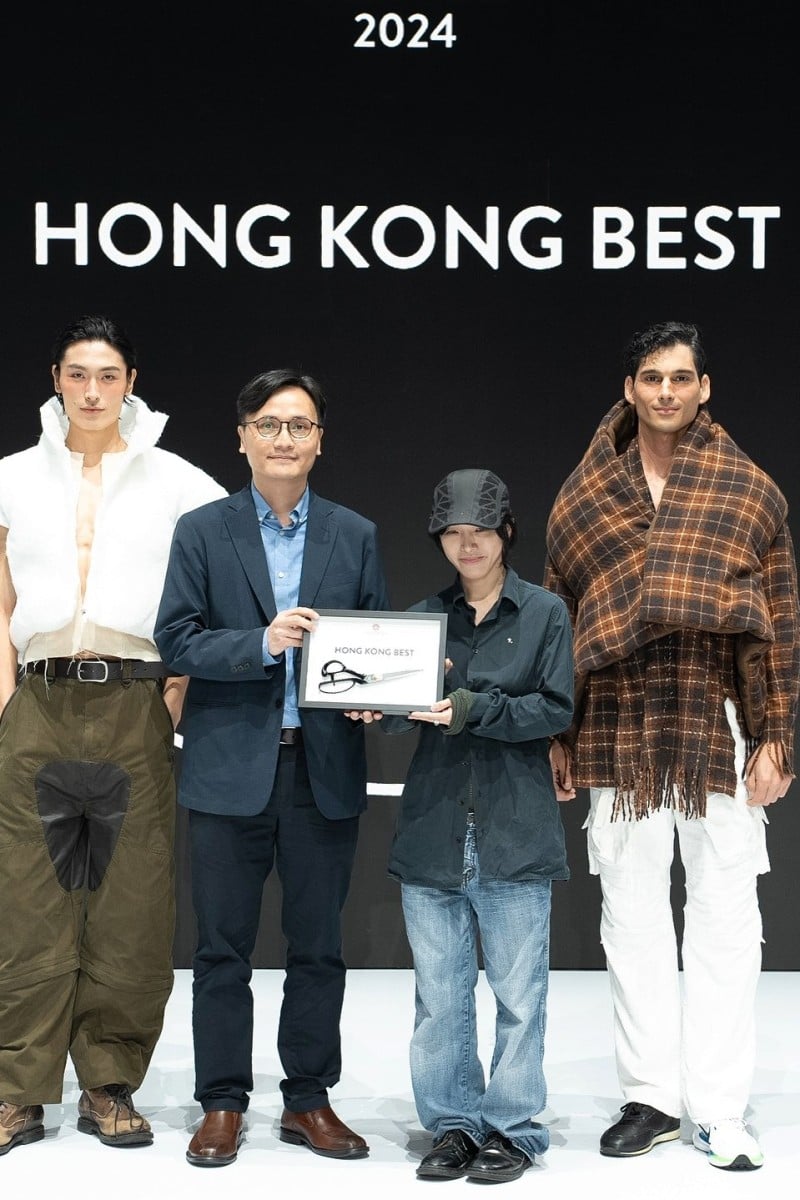
Hong Kong environmental NGO Redress crowns first local winner for annual sustainable fashion competition
Challenge asks designers to use more eco-friendly practices to play their part in fighting climate change, which will hit Asia the hardest
 Tiger Chung (second from right) accepts the grand prize at the Redress Design Award 2024. Photo: Redress
Tiger Chung (second from right) accepts the grand prize at the Redress Design Award 2024. Photo: RedressBefore you read: Annual competition from Hong Kong NGO Redress highlights the role fashion designers can play in fighting climate change.
Think about it: What are some ways young people can be more sustainable in their fashion choices? How does Chung uphold sustainable values?
Bright lights flooded the stage as the judges announced the winner of the 2024 Redress Design Award: Hongkonger Tiger Chung.
Chung’s fashion design dream began as a child with do-it-yourself activities and crafts. Two decades later, they became the first Hongkonger to win this award with clothes made of discarded towels, curtains, socks, and even a sofa.
Redress, an environmental NGO based in Hong Kong, launched the challenge, now in its 14th cycle, to educate and inspire young designers to adopt more sustainable practices.
Ten finalists, including Chung, were selected from the hundreds of applications worldwide. The finalists travelled to Vietnam in August to complete a group challenge – which Chung’s team won – and then later to Hong Kong for another challenge.
The grand final fashion show took place on September 6 at the Hong Kong Convention and Exhibition Centre, which displayed four outfits from each designer. Hundreds of guests gathered to watch the models showcase the collections on the runway.
A panel of 10 judges crowned Chung the winner, using criteria emphasising sustainability.
“Tiger stood out because of their incredible talent in designing with really complex waste streams,” said Redress founder and board chair Dr Christina Dean. “They are very brave and talented.”
Lessons from wanderers
Chung’s collection was called “The Wanderer” and featured outfits made from discarded materials from hotels, airlines, and refuse collection points in Hong Kong.
“This collection is actually inspired by the wanderer through the observation of their outfit and lifestyle, reflecting the wealth disparities in fashion and how to make a more sustainable world with our purchasing decisions,” Chung said.
“It’s not about rich and poor ... it’s to present a vision of fashion that is more inclusive and reflective of the real world.”
Even after accepting the award, Chung was speechless.
“I tried not to expect anything because I didn’t want to feel disappointed or be arrogant,” Chung said.
Now, after years of studying and experimenting with different materials and techniques, Chung will get to create a sustainable design project in collaboration with Tommy Hilfiger as part of their prize for winning the award.
“Tiger is the first time we have had a first-prize winner from Hong Kong. This really goes to show the talent [we have],” Dean said.
Achieving sustainable fashion
Chung graduated from Nottingham Trent University with a BA in Fashion Design and holds a Higher Diploma in Fashion Design from Hong Kong Design Institute.
Last year, they began working on their fashion label Tigerstrolling, which focuses on aesthetics and silhouette with a zero-waste mentality.
“I love to use extreme [materials] like bottle caps, and I [used] chicken wing bones to embellish tops in my previous collection,” they said.
Dean and Chung emphasised the importance of sustainable fashion in fighting the climate crisis, which many experts say will hit Asia the hardest.
The United Nations and the World Meteorological Organization (WMO) predict that Asia will heat up faster than the global average, with climate change already uprooting people’s lives. In 2023, extreme weather led to more than 2,000 fatalities and impacted around nine million people on the continent.
Asia is responsible for over half of global primary energy consumption because it provides 66 per cent of garment, textile and footwear exports, according to figures from the World Trade Organization (WTO).
Fashion a sustainable future: Hong Kong ethnic minority youth design and model upcycled clothes
The fashion industry relies on land to meet its huge demand, which leads to massive deforestation and drains natural resources like water. Fast fashion – clothes that are made and sold cheaply – is one of the worst offenders, responsible for about 10 per cent of global carbon emissions, according to the UN Environment Programme.
For these reasons, Redress hopes to educate designers and consumers about more sustainable practices.
Dean emphasised the importance of buying durable clothes that can last a long time, getting clothes second-hand and buying from sustainable designers.
If fast fashion is the only option, she recommended brands and lines prioritising “a sort of eco component ... maybe they have more recycled content”.
“I think [youths] should know that fashion is amazing, and they can partake in it in really beautiful ways ... the fashion industry is a vehicle to amazing creativity, amazing innovation,” Dean said.
